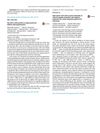Directed Elimination of Senescent Cells by Inhibition of BCL-W and BCL-XL
April 2016
in “
Nature communications
”
TLDR Blocking specific proteins can help remove aging cells and might treat age-related diseases and promote hair growth.
The study "Directed elimination of senescent cells by inhibition of BCL-W and BCL-XL" demonstrated that inhibiting the proteins BCL-W and BCL-XL with the drug ABT-737 effectively induced apoptosis in senescent cells both in vitro and in vivo. This led to the elimination of senescent cells in the lungs and skin of mice, resulting in increased hair-follicle stem cell proliferation and improved tissue function. The findings suggested that targeting these anti-apoptotic proteins could be a promising strategy for treating age-related diseases and promoting tissue regeneration.
